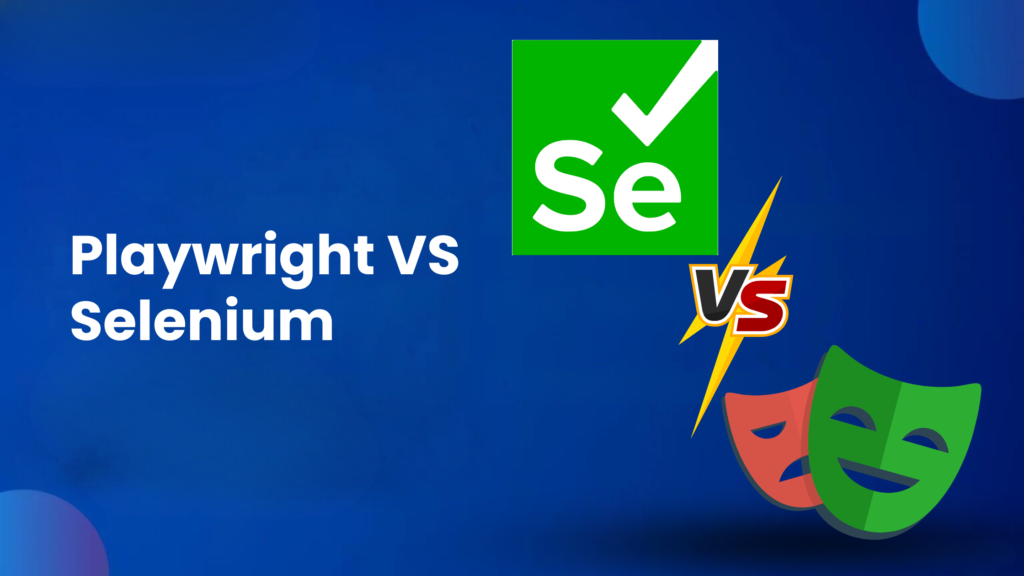

Playwright vs. Selenium
Automation process through Web has been the most indispensable part of the Software Development life cycle, specifically for performing tasks like testing, web scrapping and interaction with browsers. In the last couple of years various tools have been developed for making the automation process easier and faster. Selenium and Playwright have emerged as the most preferred test automation tools among developers and testers. Even though both selenium and playwright ensure proper browser automation capabilities, yet they differ in many ways like architecture, performance, browser support and ease of use especially among non coders.
This blog will give a detailed comparison between these two automation tools on main aspects that are important for developers and testers for performing web based automation testing.
1. Architecture
Selenium architecture: Selenium is an open source freely available test automation tool which has been dominating the software testing field since 2004. It has a robust architecture which has been improving after every updates. Selenium works on the basis of client-server model which are as follows:
a)Selenium WebDriver: Selenium WebDriver acts as a client which sends request in the form of commands to the browser through either Selenium server or a WebDriver server for a particular browser.
b)WebDriver API: WebDriver API acts as a connecting link between test script and browser which manages actions like click, text input in a text field and filling up form etc.
c)Languages: Selenium can be used effectively in multiple programming languages like Java, Python,Ruby etc. thus allowing developers to write test scripts in the language they prefer based on their project requirements.
Playwright architecture: Playwright is an advanced test automation tool developed by Microsoft in the year 2020. It’s working is also based on client- server model but in a more optimised manner compared to selenium. Playwright works with Node.JS backend and its detailed operations are mentioned below:
Client Server interaction: Client and browser server(Chrome, FireFox and Webkit) interaction happens directly with the help of WebSocket connections.
Playwright Library: Playwright library is made in such a way that it can seamless work with different supported browsers thus removes the need of using separate browser drivers.
Headless testing: Playwright architecture has been designed to be fast, effective and reliable along with support for modern browser functionalities like headless testing.
Differences in Architecture: Even though Architecture of both tools are based on client -server model, Playwright has advanced and elegant approach due to its simplicity in browser management. Selenium needs more additional components like browser specific drivers(eg:chromedriver for chrome browser, geckodriver for firefox browser etc.) and selenium server which can increase complexity in configuration.
2. Performance
Performance is one of the most important parameters while making a choice between selenium and playwright. Web based automation testing is used in case of test scenarios where speed is an important factor and Playwright has been developed for ensuring test execution at high speed.
Selenium Performance
Slower execution of tests: In Selenium test execution is slower due to the overhead developed by Selenium server and webdriver. Every automation test command is being sent to webdriver which slows down the execution of tests.
Communication with Browser: There is slow communication between client and browser due to usage of conventional protocols where more round trip requests are needed.
Playwright Performance
a) Faster execution of tests: Playwright is developed for ensuring faster test execution. There is a direct communication between playwright and browser using websocket thus removing the overhead as it was seen in selenium.
b)Parallel test execution: Playwright ensures effective parallel test execution which is necessary to speed up the testing pipelines.
c) Headless browser automation: Even though both Playwright and Selenium support Headless testing, the headless browser automation in playwright is faster and effective compared to selenium.
Difference in Performance: Playwright is better than Selenium on the basis of speed, reliability and parallel execution of tests.
3. Browser Support
Support for browser is important in order to perform parallel and cross browser automation testing. Even though both Playwright and Selenium support parallel and cross browser testing across multiple browsers, they still vary in their speed and capabilities.
Selenium Browser Support:
Selenium supports multiple browsers for parallel and cross browser automation. Some browsers which are compatible with selenium are Chrome, FireFox, Edge, Safari etc. Through Appium it supports mobile based browsers. But the compatibility with Safari on mac OS can be a bit difficult and requires additional configuration and setup.Even though Selenium supports multiple browsers, it may not support specific version of browser and its updates due to dependency on drivers of webdrivers.
Playwright Browser support:
Playwright also supports multiple browser but compared to selenium it has a modern and proper approach. Some of the browser that are supported by Playwright are Chromium which also includes Chrome and Edge, FireFox, Webkit etc. Playwright integration with Webkit is a unique feature as it ensures seamless testing through Safari browser without requiring macOS. Playwright gives important binaries which removes dependency on external drivers.
Difference in Browser Support: Playwright is compatible with multiple browsers through a single API and ensure better integration for browsers like WebKit, Chromium etc. Selenium needs external web drivers for supporting multiple browsers and may also need complex drivers for supporting specific version of browser.
4. Ease of use among Non Programmers:
Ease of use becomes the most critical factor for non-programmers and software testers with zero coding experience. Even though both tools require some coding knowledge, Playwright seems to be more user-friendly and easy to use among non-coders.
Selenium ease of use
Programming knowledge is a necessary: As Selenium supports various programming languages and provides bindings for them, it ensures flexibility but it is also necessary to have expertise in programming concepts. Thorough coding knowledge make it easier for developers to integrate Selenium in their existing projects.
Complexity of setup: Setting up Selenium can be bit difficult for beginners and non coders. It is required to download the correct version of the webdriver for the browser and configure it into the local system which is a tedious task.
Community Support: Selenium being the oldest test automation tool compared to Playwright has a very large community support as a result of which it is easy to find the solution to problems and the documentation.
Playwright ease of use
JavaScript/TypeScript centric: The development of Playwright is made keeping in mind JavaScript and TypeScript programming languages. This makes the job of developers easier who are using these programming languages. Playwright has a simplified and advanced API which ensures simplified interaction with browsers.
Easy setup: Playwright has a simple setup without any dependencies of external webdriver. Playwright seamlessly works with multiple supported browsers just by installing the package.
Interactive mode: The interactive mode of Playwright allows to record the browser actions and transform them into readable codes which is essential for non programmers or testers who have zero experience in coding. The record and playback functionality removes the necessity of writing codes for simple tests.
Difference in ease of use: The simplified setup and advanced feature of Playwright alongwith features like interactive mode of code generation makes it easier to use among non programmers as compared to selenium which require a better understanding of principles of web based automation and setup.
5. Additional features
Both Selenium and Playwright have additional features that increases their usability and reliability.
Selenium Features
Multi Language Support: Selenium is compatible with multiple languages thus ensuring that different kind of users can utilise it effectively.
Cross Platform Support: Selenium runs seamlessly across multiple operating systems and supports mobile and desktop testing.
Integration with other tools: Selenium integrates easily with tools like TestNG, JUnit and Jenkins for management of tests and Continuous Integration respectively.
Playwright Features
Auto wait: Playwright waits automatically for elements to get fully loaded before performing any actions thus reducing flakiness in tests.
Interception of Network: Playwright ensures interception of network and mock network requests which is necessary for testing edge cases and failure scenarios.
Multiple Contexts: Playwright can reproduce different sessions of users in the same browser by generating multiple contexts. This is essential for testing applications having multiple users.
Mobile Emulation: Playwright supports mobile emulation thus making it easier for testing of mobile views without any dependence on real device.
Difference in Features: Playwright gives more advanced features like automatic wait, network interception and multiple contexts which makes it a powerful and more efficient tool for testing of complex functionalities.
Conclusion
Playwright and Selenium have their respective advantages according to the project requirements. Selenium is needed for performing extensive cross browser testing. Selenium’s seamless integration with multiple languages and its vast community support makes it the most preferred choice for traditional web based testing. Playwright is needed in case of modern features, faster test execution and more deeper integration with advanced browsers.Playwright is mostly suitable for developers or testers working in JavaScript/TypeScript based applications. Remember to practise, stay updated with the latest trends in Python with Playwright Course,and maintain a positive attitude throughout your interview process.Playwright’s ability to integrate with multiple browsers without depending on external webdrivers provides it a competitive advantage over selenium. Non coders can easily use playwright and gain its feature rich experience due to its simplified setup and the ability to record, generate the code and playback the test execution. Even though selenium is popular and has a large user base, playwright’s advanced approach is rapidly gaining popularity due to its speed, modern feature and ease of use among developers and testers.
Also read:
Consult Us


















